Pmed ch 38 Study guides, Class notes & Summaries
Looking for the best study guides, study notes and summaries about Pmed ch 38? On this page you'll find 6 study documents about Pmed ch 38.
All 6 results
Sort by
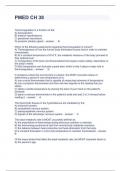
-
PMED CH 38 QUESTIONS WITH ACCURATE ANSWERS 2023
- Exam (elaborations) • 17 pages • 2023
- Available in package deal
-
- $18.99
- + learn more
PMED CH 38
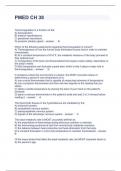
-
PMED CH 38 QUESTIONS AND ANSWERS 2023
- Exam (elaborations) • 17 pages • 2023
- Available in package deal
-
- $18.49
- + learn more
PMED CH 38
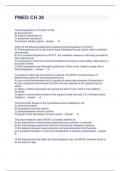
-
PMED CH 38 Questions with correct Answers 2023
- Exam (elaborations) • 17 pages • 2023
- Available in package deal
-
- $18.49
- + learn more
PMED CH 38
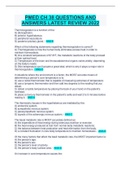
-
PMED CH 38 QUESTIONS AND ANSWERS LATEST REVIEW 2022
- Exam (elaborations) • 16 pages • 2022
-
- $11.49
- + learn more
PMED CH 38 QUESTIONS AND ANSWERS LATEST REVIEW 2022 Thermoregulation is a function of the: A) diencephalon. B) anterior hypothalamus. C) peripheral vasculature. D) posterior pituitary gland. - ANS-B Which of the following statements regarding thermoregulation is correct? A) Thermogenesis is how the human body eliminates excess heat in order to maintain homeostasis. B) At a constant temperature of 97.6°F, the metabolic reactions of the body proceed at their optimal level. C) Tempe...
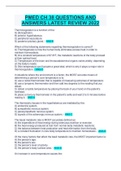
-
PMED CH 38 QUESTIONS AND ANSWERS LATEST REVIEW 2022
- Exam (elaborations) • 16 pages • 2022
- Available in package deal
-
- $11.49
- + learn more
PMED CH 38 QUESTIONS AND ANSWERS LATEST REVIEW 2022 Thermoregulation is a function of the: A) diencephalon. B) anterior hypothalamus. C) peripheral vasculature. D) posterior pituitary gland. - ANS-B Which of the following statements regarding thermoregulation is correct? A) Thermogenesis is how the human body eliminates excess heat in order to maintain homeostasis. B) At a constant temperature of 97.6°F, the metabolic reactions of the body proceed at their optimal level. C) Tempe...
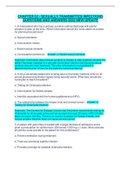
-
MIXED CHAPATERS MED SURG AND OTHER NURSING TESTS COMBINED BUNDLE SOLUTION 2022/2023 LATEST UPDATE A+ GRADE
- Package deal • 18 items • 2022
-
- $27.99
- + learn more
CHAPTER 52 - SEXUALLY TRANSMITTED INFECTIONS,CHAPTER 53 - FEMALE REPRODUCTIVE PROBLEMS,LEWIS MED-SURG CH 14,CHAPTER 53: VITAMINS AND MINERALS,LEHNE 9TH EDITION CHAPTER 49: ANTIDYSRHYTHMIC DRUGS,MCKINNEY CHAPTER 16 PRACTICE,OB MCKINNEY CH 17: INTRAPARTUM FETAL SURVEILLANCE,GIDDENS CH 38 INTERPERSONAL VIOLENCE EAQ,PMED CH 38 CONTINUES.......



